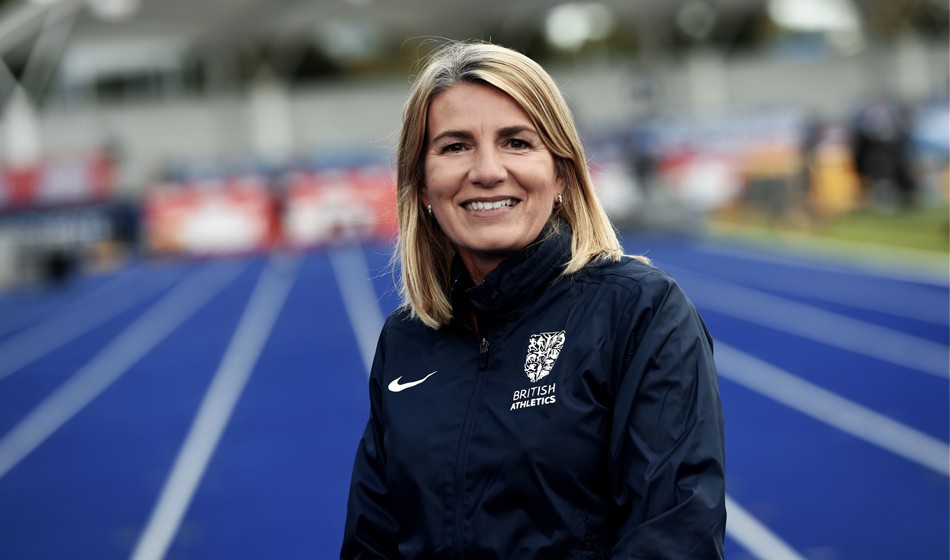
Ian Beattie’s first week as governing body’s chairman sees departure of chief executive Coates and performance director Symington
The Jo Coates and Sara Symington combination that enjoyed such success at England Netball has ultimately floundered in the more complex sport of track and field as their short reign as chief executive and performance director at UK Athletics came to a sudden end this week.
The governing body released a statement at 7.30pm on Thursday (Oct 21) to say “they had given notice from their respective roles”. Mark Munro, the recently appointed development director, will become interim chief executive for six months, while the search will begin for a replacement for Symington, who after being with UKA for little over a year has now swiftly landed a role as head of British Cycling’s Olympic and Paralympic programmes.
Ian Beattie, who started his new position as chair of UKA this week, said: “I’d like to thank Jo and Sara for their work during their time at UK Athletics and I wish them both all the best for the future.” The news was met with anger from elite athletes on social media, too, with a number voicing frustration that they heard via twitter that Symington was moving to British Cycling.
It is unclear whether they jumped or were pushed but it seems more likely to be the latter and it is perhaps no coincidence that Beattie began his role in the past few days. Coates and Symington both worked together to good effect in netball prior to joining UKA, but adapting to athletics has proved challenging.
Where netball is popular and female-dominated team sport that is played by only a handful of countries across the world, athletics is the most globally competitive sport on the planet, the biggest Olympic sport and a complicated ‘sport of many sports’ with sprinters, hurdlers, endurance runners, race walkers, throwers and jumpers tackling widely varied disciplines. In addition, there are multiple organisations in athletics with a rich history of in-fighting, together with a number of maverick coaches with strong personalities to deal with.
Since Coates began her role at UKA in spring 2020, she tried to apply some of the ideas and principles she learned in netball to athletics – including the appointment of Symington to work alongside head coach Christian Malcolm, but judging by today’s news it is deemed not to have worked.
Coates made safeguarding her No.1 priority and made good progress in this area, whereas she was also instrumental in helping create the Athletics Unified 12-year plan with the ambitious goal of fielding athletes in every single track and field discipline.
It did not start well, though, with only six medals – and no golds – at the Tokyo Olympics, with that tally likely to reduce to five medals due to CJ Ujah’s drugs positive. BBC’s long-time coverage of the sport has also stopped during her tenure, with the Olympic trials this summer being streamed on the governing body’s own website.
If 2020 was her honeymoon period with athletics then more recently the media pressure has cranked up with much negative publicity given to an incident at the Diamond League finals in Zurich where leading athletes and coaches expressed their concerns about UKA’s leadership to none other than World Athletics president Seb Coe.
Even when trying to do the right thing, by improving safeguarding, she has found herself under fire. She was heavily criticised, for instance, by Charlie Webster on social media when the documentary Nowhere to run: abused by our coach was aired on BBC last month.
In Coates’ defence, she started her role in unprecedented circumstances just a few days before Tokyo 2020 was postponed. She also had to run her organisation primarily by using online video conference calls and was under pressure to cut costs, leading to a number of redundancies, some of which raised eyebrows within the sport as experienced athletics experts at UKA lost their jobs.
In addition, Coates could argue she has not been given enough time. Her period in charge has been punctuated by a number of controversial incidents, too, but UKA and its predecessors have never been too far away from trouble.
When David Moorcroft became chief executive in 1997, for example, he inherited a governing body (the British Athletic Federation) that was literally poised to go bankrupt days later. The headlines at the time screamed “BAF goes bust!” and domestic televised events were briefly a laughing stock as the world’s top athletes boycotted them due to being owed money.
Moorcroft began to turn things around with the help of UKA’s London-based marketing arm Fast Track but even then had to deal with a spate of nandrolone positives to big name athletes, the Picketts Lock fiasco of 2001 and more. Yet he left the role after 10 years and was generally lauded. Such a tough job has multiple challenges and the last 18 months under Coates look tame in comparison.
Whether Coates should have been given more time is debatable. Yet surely everyone can agree on two things.
Firstly, that the sport has squandered a golden opportunity during the lockdowns and comparatively quiet competitive period of 2020 to restructure and rebuild the sport almost from scratch.
Secondly, that netball tactics don’t necessarily work in track and field.















 Phone: (800) 737. 6040
Phone: (800) 737. 6040 Fax: (800) 825 5558
Fax: (800) 825 5558 Website:
Website:  Email:
Email: 






